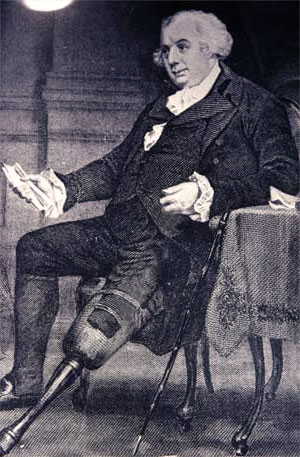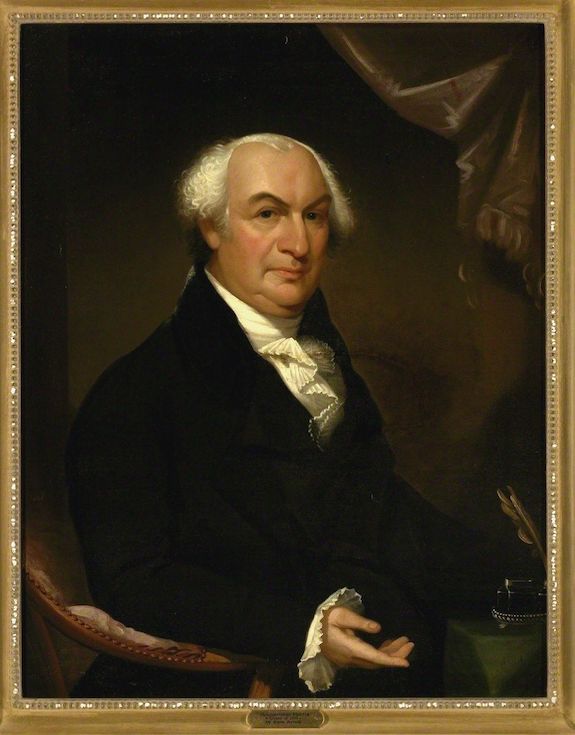“I charge you to protect his fame. It is all that he has left.”

NEW YORK, New York, July 14, 1804 – All that Alexander Hamilton might have wished to have said of him in life was poured forth today in a moving funeral oration by Gouverneur Morris, diplomat and former colleague of Mr. Hamilton both in the Continental Congress and on the Committee that framed the Constitution.
He spoke over the open coffin holding the body that collapsed in sudden death only four days ago on the Weehawken Heights, across the Hudson River in New Jersey, when Mr. Hamilton engaged in a duel with Aaron Burr.
Today no words were spoken of the controversies over politics and finance that culminated in this tragic event. Neither did Mr. Morris mention the fugitive Burr.
If on this sad, this solemn occasion, I should endeavor to move your commiseration, it would be doing injustice to that sensibility which has been so generally and so justly manifested. Far from attempting to excite your emotions, I must try to repress my own; and yet, I fear, that, instead of the language of a public speaker, you will hear only the lamentations of a wailing friend. But I will struggle with my bursting heart, to portray that heroic spirit, which has flown to the mansions of bliss.
Students of Columbia – he was in the ardent pursuit of knowledge in your academic shades when the first sound of the American war called him to the field. A young and unprotected volunteer, such was his zeal, and so brilliant his service, that we heard his name before we knew his person. It seemed as if God had called him suddenly into existence, that he might assist to save a world! The penetrating eye of Washington soon perceived the manly spirit, which animated his youthful bosom. By this excellent judge of men, he was selected as an aid, and thus he became early acquainted with, and was a principal actor in the more important scenes of our Revolution. At the siege of York, he pertinaciously insisted on and he obtained the command of a Forlorn Hope. He stormed the redoubt; but let it be recorded that not one single man of the enemy perished. His gallant troops, emulating the heroism of their chief, checked the uplifted arm, and spared a foe no longer resisting. Here closed his military career.
Shortly after the war, your favor-no, your discernment, called him to public office. You sent him to the convention at Philadelphia; he there assisted in forming that Constitution which is now the bond of our union, the shield of our defense, and the source of our prosperity. In signing the compact, he expressed his apprehension that it did not contain sufficient means of strength for its own preservation; and that in consequence we should share the fate of many other republics, and pass through anarchy to despotism. We hoped better things. We confided in the good sense of the American people; and, above all, we trusted in the protecting providence of the Almighty. On this important subject he never concealed his opinion. He disdained concealment. …
At the time when our government was organized, we were without funds, though not without resources. To call them into action, and establish order in the fInances, Washington sought for splendid talents, for extensive information, and above all, he sought for sterling, incorruptible integrity. All these he found in Hamilton. The system then adopted, has been the subject of much animadversion. If it be not without a fault, let it be remembered that nothing human is perfect. Recollect the circumstances of the moment-recollect the conflict of opinion-and, above all, remember that a minister of a republic must bend to the will of the people. The administration, which Washington formed, was one of the most efficient, one of the best that any country was ever blessed with. And the result was a rapid advance in power and prosperity, of which there is no example in any other age or nation. The part, which Hamilton bore, is universally known.
 Brethren of the Cincinnati – there lies our chief! Let him still be our model. Like him, after long and faithful public services, let us cheerfully perform the social duties of private life. Oh! he was mild and gentle. In him there was no offense; no guile. His generous hand and heart were open to all.
Brethren of the Cincinnati – there lies our chief! Let him still be our model. Like him, after long and faithful public services, let us cheerfully perform the social duties of private life. Oh! he was mild and gentle. In him there was no offense; no guile. His generous hand and heart were open to all.
Gentlemen of the bar-you have lost your brightest ornament. Cherish and imitate his example. While, like him, with justifiable and with laudable zeal, you pursue the interests of your clients, remember, like him, the eternal principle of justice.
Fellow citizens – you have long witnessed his professional conduct, and felt his unrivaled eloquence. You know how well he performed the duties of a citizen-you know that he never courted your favor by adulation or the sacrifice of his own judgment. You have seen him contending against you, and saving your dearest interests, as it were, in spite of yourselves. And you now feel and enjoy the benefits resulting from the firm energy of his con- duct. Bear this testimony to the memory of my departed friend. I charge you to protect his fame. It is all he has left – all that these poor orphan children will inherit from their father. But, my countrymen, that fame may be a rich treasure to you also. Let it be the test by which to examine those who solicit your favor. Disregarding professions, view their conduct, and on a doubtful occasion ask, would Hamilton have done this thing?
You all know how he perished. On this last scene I cannot, I must not dwell. It might excite emotions too strong for your better judgment. Suffer not your indignation to lead to an act, which might again offend the insulted majesty of the laws. On his part, as from his lips, though with my voice- for his voice you will hear no more – let me entreat you to respect yourselves.
And now, ye ministers of the everlasting God, perform your holy office, and commit these ashes of our departed brother to the bosom of the grave.
